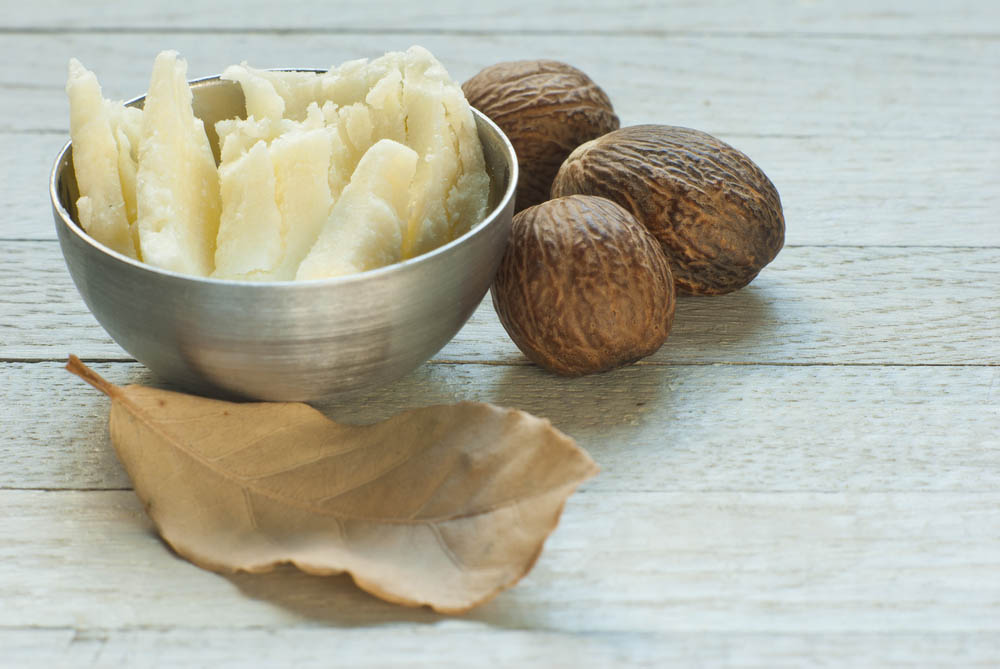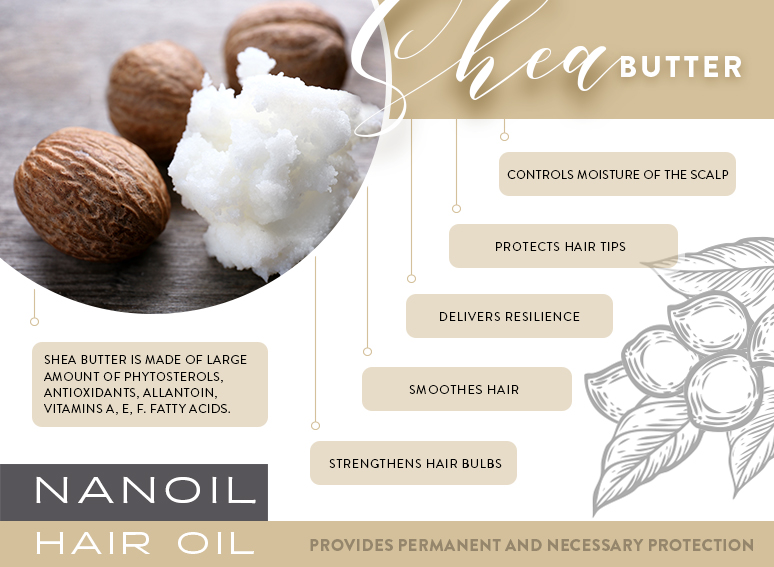- NANOIL Products
- Oils
- Face serums
- Hair masks
- Shampoos
- Hair conditioners
- Hair styling
- Hair Porosity Test
- Blog
- Contact

We know shea butter (Butyrospermum Parkii Butter) very well. Although it is far more common in lotions and creams, shea butter is extremely effective in hair care. This African solid oil is the remedy for all skin problems. It contains natural SPF3, adds bounce and radiance. Shea butter is abounding in vitamins, phytosterols and allantoin. As a consequence, it can successfully replace a hair conditioner.
Production of shea butter started in the vast areas of African savannah. The western part of the continent proved to have the most favourable climate for vitellaria - karité tree that shea butter is extracted from. The plant can be found in 19 African countries.
Shea tree reaches even 25 metres and starts to bear fruit after 30-40 years. That is why, there are very few shea tree plantations, and shea butter is extracted from the trees that grow in the wild, which makes it quite pricy. The seeds of the fruits are incredibly rich in fat so they can be easily turned into valuable shea hair butter through cold pressing.
Butyrospermum Parkii Butter
Natural shea butter is a creamy and beige oil of solid formula. It is hard at room temperature and gets fluid at temperature above 37°C. However, there is no need to worry about washing shea butter off hair. If you do not apply too much, it is non-greasy and does not weigh hair down. It has a characteristic nut aroma of a delicate woody note due to roasting the seeds. But we must be aware that the colour and scent of shea butter may differ, depending on whether it is fresh unrefined and cold-pressed or not. It is usually lighter and loses its aroma after the refinement.
As we explore the subject of plant butter, we should not forget about the refinement. Which one is better: unrefined shea butter or refined shea butter? The refinement process involves purifying the oil that has been extracted. It is performed to e.g. make the oil edible.
Only the unrefined shea butter should be used in hair care. The reason is very simple. Vegetable oils lose lots of precious nutrients during the process of purification. Refined shea butter is much poorer and may work worse. It is advisable to reach for unrefined shea butter for hair oiling. Then, we can be sure that we will make use of all properties that shea butter conceals. And there are lots of them.
After quite long introduction, it is time to move on to another crucial thing: shea butter properties. What are hair and skin benefits? How to use shea butter? What does it offer? Most of all – why is it so popular in cosmetics? Answers to all these questions are in its composition. Shea butter is made of large amount of phytosterols, antioxidants, allantoin, vitamins A, E, F. It also contains valuable fatty acids.
It is a cosmetic raw material that is famous for its excellent moisturising properties. Thanks to about ten antioxidant compounds, it slows down skin ageing processes and ensures its cellular renewal. Moreover, shea butter has the ability to treat skin conditions. It speeds up healing of scars and eczema, reduces rash, soothes irritation. Shea butter is also a natural UV filter and works wonders in skin care (also scalp). Thanks to a large content of natural allantoin, shea butter eliminates discolouration and repairs epidermis.

Shea butter is usually included in skin care products (e.g. creams, balms). It has similarly interesting properties when it comes to hair care. That is why, cosmetic companies like to use the butter also in hair care products.
Most of all, it shields hair from harmful radiation, which is extremely important for hair exposed to the effects of the sunlight. It also brings reinforcement after hairstyling treatments e.g. colouring or straightening. Shea butter smooths hair and delivers resilience for easy combing and delightful natural gloss. It can be used as a separate product. However, it is a better idea to choose products that include shea butter e.g. Nanoil for low porosity hair. It splendidly protects hair tips, strengthens hair bulbs and controls moisture of the scalp.
We must take a closer look at the content of fatty acids to answer the question. It is one of vegetable oils that can boast about the balance of the acids. Shea butter is mainly made of oleic acid (monounsaturated) and stearic acid (saturated). Their amount is similar, therefore shea butter works for two hair types.
Shea butter is absolutely unsuitable for high porosity hair. Information that shea butter is ideal for damaged, split and weak hair should be treated with a grain of salt. It is not true. The butter will only worsen the condition of high porosity hair and make it frizzy. Natural shea butter is perfect for low porosity hair and that is why it can be found in Nanoil for low porosity hair. We can try to apply shea butter to medium porosity hair but there is no guarantee it will bring good effects. It depends on the individual condition of our hair.
Undoubtedly, it is one of the most popular plant butters. It rules among natural cosmetic ingredients. Shea butter receives amazing opinions but we still wonder why it is recommended for high porosity hair. It might be due to the fact that the butter excellently moisturises. But it has no strong repairing properties. On the other hand, when we use it for low porosity hair, it provides permanent and necessary protection.
Comments: #0